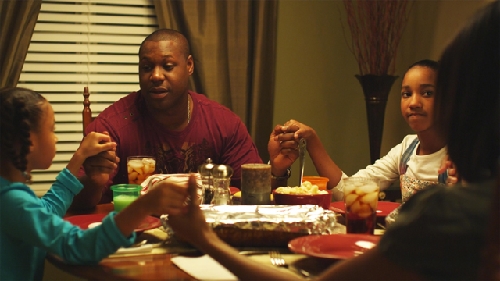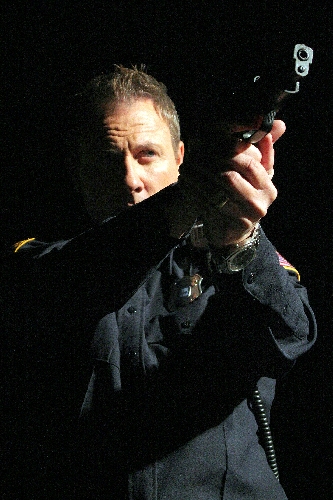In-your-face message of ‘The Grace Card’ slows dramatic action, but movie’s heart in right place
In a message movie, which comes first -- the movie or the message?
Some movies try to combine the two -- a bad idea, according to golden-age Hollywood mogul Sam Goldwyn, whose motto was, "If you want to send a message, use Western Union."
But "The Grace Card" has other ideas. After all, it's produced by a Memphis-area church. Its screenplay began as the script for one of the church's passion plays. And many of its cast members come from area churches.
So it's hardly a surprise that "The Grace Card" proudly embraces its faith-based agenda.
And while there's never any question regarding its message, "The Grace Card" also manages to work as a movie more often than you might expect.
An extremely melodramatic and often contrived movie, to be sure, but one with definite strengths as well as weaknesses.
Set in Memphis, "The Grace Card" uses the city's racial divide as a major plot point.
On one side of the divide: embittered white cop Bill "Mac" McDonald (Michael Joiner), forever haunted by his young son's death while riding a bicycle.
It's been almost two decades since his son's death, but Mac's never really recovered, instead shutting himself off from his long-suffering wife Sara (Joy Parmer Moore) and antagonizing his teenage son Blake (Robert Erickson ).
Mac's emotional problems also show up at the Memphis Police Department, where his hostile -- and racist -- attitudes have sabotaged his efforts at advancement and alienated his fellow officers, black and white.
That includes Mac's new partner, upbeat Sam Wright (Michael Higgenbottom ), who's recently been promoted to sergeant.
But being a cop is only his weekday job; Sam's real calling is the ministry. On Sundays, he preaches at his small church -- and wonders the rest of the week whether he's following the wrong path.
Especially when he's stuck on patrol with a partner like Mac -- whose tendency to charge ahead rather than proceed with caution could get them both killed.
It's a promising premise. And during the early going, "The Grace Card" earns points for its willingness to depict undeniably grim situations, from potentially violent police calls to Blake's rebellious behavior.
In addition, screenwriter Howard Klausner ("Space Cowboys") gives the dialogue a welcome tang, lifting the central characters' exchanges -- and, by extension, the movie as a whole -- above the level of a wholesome Sunday-school lesson.
Sam's internal struggles also give "The Grace Card" an intriguing spiritual angle -- one that gains impact through the brief but powerful presence of Sam's grandpa George (Louis Gossett Jr.), whose words of wisdom help Sam understand the connection between policing and preaching.
Alas, it's too good to last.
Just when we're delving deeper into Sam's internal conflicts, "The Grace Card" veers back toward the wrenching melodramatic developments designed to push Mac toward a spiritual crisis that only Sam -- and God -- can help him solve.
Yes, we know Mac's got to learn his lesson. After all, that's "The Grace Card's" ultimate reason for being.
But is it too much to ask that the lesson not be quite so in-your-face and over-the-top?
Apparently it is, because director David Evans and screenwriter Klausner embrace every opportunity to pile on the platitudes. In the process, they slow the (melo)dramatic action to a crawl, thereby violating another hallowed cinematic rule: Blessed are those who show rather than tell.
Evans (an optometrist by trade, making his big-screen debut after directing church passion plays) also makes a few other beginner mistakes, especially when he wastes valuable screen time with lingering glimpses of Memphis landmarks -- and gritty inner-city neighborhoods. There's a difference between creating an atmosphere and being self-indulgent -- and Evans hasn't quite learned that one yet.
Yet, for a movie with a reportedly modest $200,000 budget, "The Grace Card" boasts a persuasive look (thanks in part to director of photography John Paul Clark) and several persuasive performances.
More than might be expected in a movie cast with "believing actors" (as the press notes phrase it) from more than 50 Memphis-area churches.
Of course, some of the nonprofessional performers either seem too subdued -- or too theatrical. But Cindy Vines (as a blunt but empathic counselor) and former "American Idol" contestant Dawntoya Thomason (as Sam's understanding wife) manage to find a balance between the two extremes. And old pro Gossett sagely resists the impulse to overpower everybody else around him, delivering "The Grace Card's" most moving grace notes.
Joiner, a stand-up comedian, gives Mac a sardonic edge that softens some of his character's more repellent traits. And the theater-trained Higgenbottom, in an impressive big-screen debut, doesn't oversell either side of Sam's dilemma, conveying his staunch beliefs, and his all-too-human doubts, with earnest but low-key conviction.
And it's that down-to-earth sincerity that keeps "The Grace Card" from sinking under the weight of its positive, heartfelt message. Even (and especially) when the movie's preaching to the choir, its heart is always in the right place.
Contact movie critic Carol Cling at ccling@reviewjournal.com or 702-383-0272.
Review
"The Grace Card"
103 minutes
PG-13; violence, mature themes
Grade: C+
at multiple locations
Deja View
From comedy to drama to suspense, true believers find their faith tested in these movies with religious themes:
"I Confess" (1953) -- A Catholic priest (Montgomery Clift) sworn to silence hears a murderer's confession -- and finds himself accused of the crime -- in this Alfred Hitchcock thriller.
"Friendly Persuasion" (1956) -- A Quaker family (led by Gary Cooper, Dorothy McGuire and then-newcomer Anthony Perkins) struggles to follow their peaceful beliefs as the Civil War approaches.
"Purlie Victorious" (1963) -- A self-appointed preacher (Ossie Davis, who adapts his stage satire) returns home to rural Georgia to scam the plantation owner he once served; Ruby Dee, Godfrey Cambridge, Beah Richards and Alan Alda (in his movie debut) co-star.
"The Apostle" (1997) -- Robert Duvall writes, directs, produces and stars (with Farrah Fawcett, Miranda Richardson and Billy Bob Thornton) in this tale of a womanizing Pentecostal minister forced to leave his Texas home after a violent act.
"Doubt" (2008) -- In 1964 New York, a stern nun (Meryl Streep) in charge of a Catholic high school suspects the gregarious priest (Philip Seymour Hoffman) of an unnatural interest in the school's first black student.
-- By CAROL CLING






















